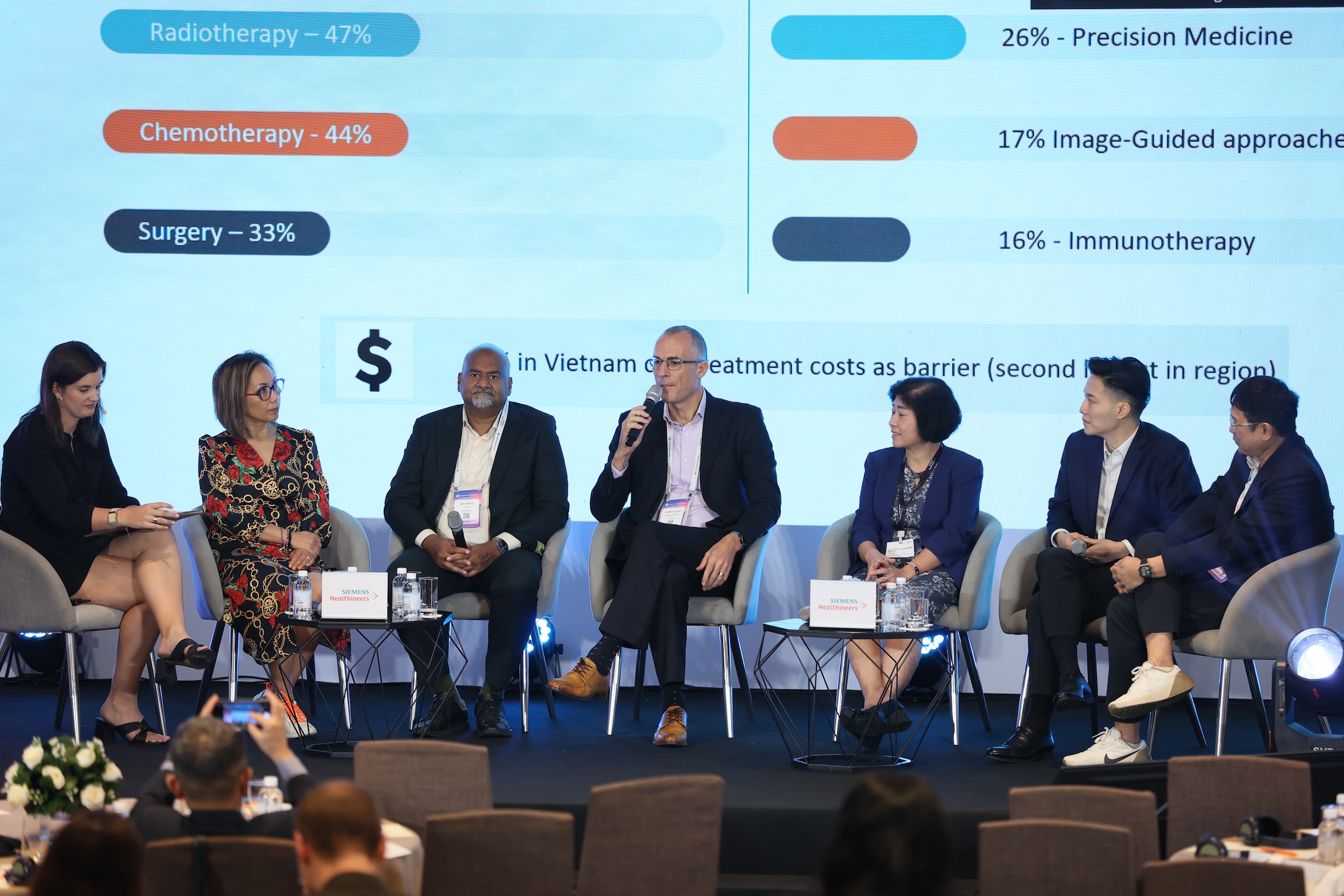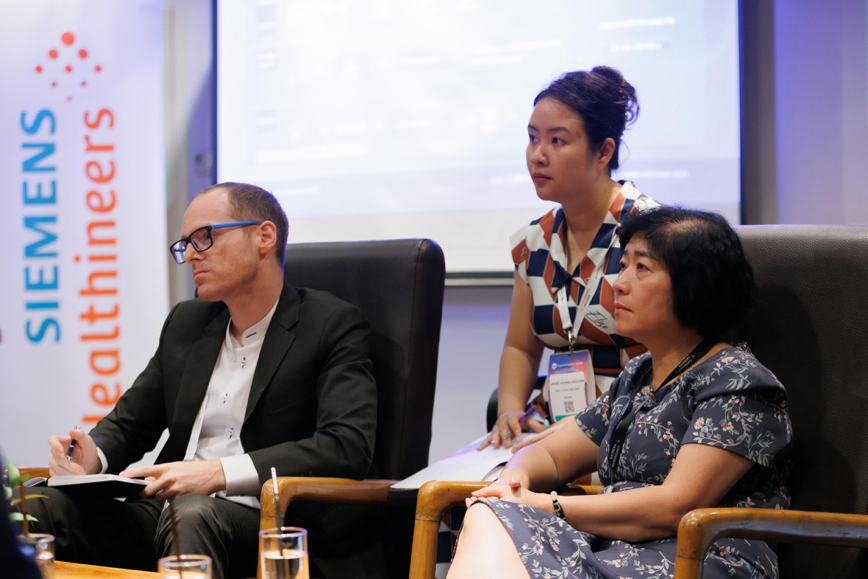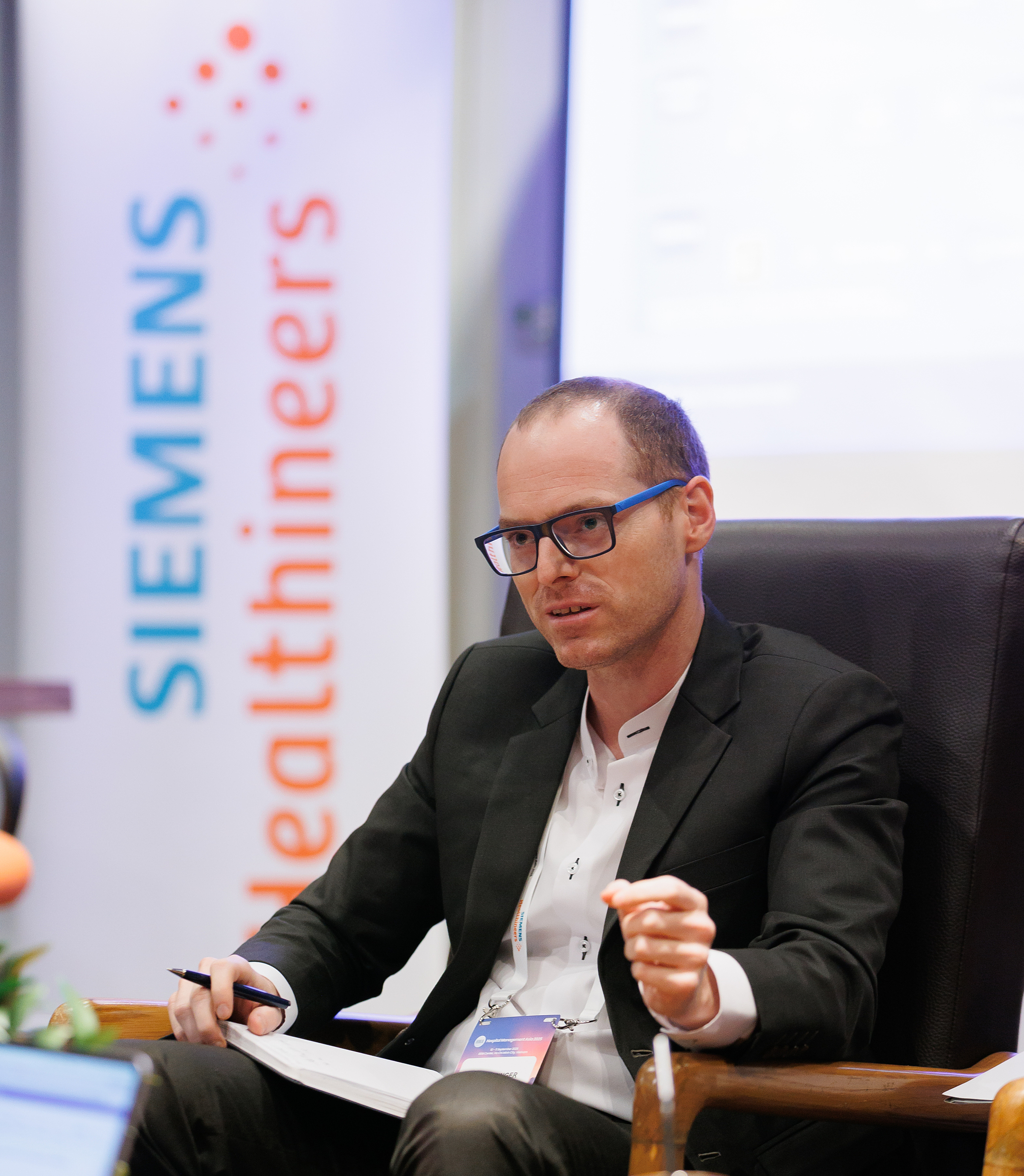Associate Professor Tran Thi Thanh Huong shared this information at the announcement of the "Bridging the Gaps: Public Perceptions of the Cancer Care Continuum in Southeast Asia" survey results on 10/9 in Ho Chi Minh City.
The online survey, commissioned by Siemens Healthineers and conducted by YouGov, involved nearly 6,400 people in six Southeast Asian countries: Indonesia, Malaysia, the Philippines, Singapore, Thailand, and Vietnam. Conducted from July 21st to 29th, the survey targeted individuals chosen from YouGov's representative survey community to reflect the general perception of cancer care in countries with rising cancer rates.
 |
Siemens Healthineers representatives and guests shared and analyzed the survey results at the seminar. Photo: Siemens Healthineers |
Siemens Healthineers representatives and guests shared and analyzed the survey results at the seminar. Photo: Siemens Healthineers
The results show that 84% of Vietnamese participants believe in the benefits of early cancer screening for improved treatment outcomes. However, only 34% have actually undergone screening. This data suggests a need for stronger collaboration between public and private healthcare sectors to promote and raise public awareness.
56% of Vietnamese respondents believe they are likely to develop cancer in their lifetime—the highest percentage among the six participating countries. Despite this, screening rates remain low. The main reasons cited include feeling it is unnecessary (35%), high costs (22%), and fear of a cancer diagnosis (22%).
Associate Professor Tran Thi Thanh Huong believes the survey results reflect an urgent need for public education. The lack of understanding about post-treatment care highlights the need for healthcare professionals to better support patients through their cancer journey and beyond.
With over 130 scientific publications, Dr. Huong has coordinated numerous breast and cervical cancer screening programs both domestically and internationally. She emphasized the survey's importance as a data source for national cancer control strategies, especially in workforce training and awareness campaigns. Dr. Huong believes public-private partnerships can effectively reduce time and costs associated with raising public awareness about early screening.
 |
Associate Professor Tran Thi Thanh Huong (right) emphasizes the crucial role of early cancer screening in prevention strategies and improving treatment effectiveness. Photo: Siemens Healthineers |
Associate Professor Tran Thi Thanh Huong (right) emphasizes the crucial role of early cancer screening in prevention strategies and improving treatment effectiveness. Photo: Siemens Healthineers
In recent years, Vietnam has established several centers specializing in diagnosing and treating specific cancers like lung, breast, and cervical cancer, in addition to general hospitals. These centers are built with public resources and supported by private companies specializing in medical technology.
"Specialized centers should only be established for cancers with high prevalence rates in the country to avoid dispersing resources and impacting the overall national treatment and screening network," Associate Professor Tran Thi Thanh Huong emphasized.
Representing the medical technology sector, Fabian Martin Singer, Managing Director of Siemens Healthineers Vietnam, believes public-private partnerships are key to bridging the gaps in most areas to increase early detection and cure rates.
"By combining clinical expertise with technological innovations, we can support earlier detection, more precise treatment, and better long-term care," Singer added.
 |
Fabian Martin Singer, Managing Director of Siemens Healthineers Vietnam, emphasizes that public-private partnerships are essential for improving cancer care quality. Photo: Siemens Healthineers |
Fabian Martin Singer, Managing Director of Siemens Healthineers Vietnam, emphasizes that public-private partnerships are essential for improving cancer care quality. Photo: Siemens Healthineers
This model clearly demonstrates the advantages of public-private partnerships. Public hospitals provide infrastructure, clinical staff, and patient access, while private companies like Siemens Healthineers contribute modern technology and equipment, user training, and international experience.
The survey also reveals a lack of knowledge about modern cancer treatments introduced in recent years in the six Southeast Asian countries. Respondents are familiar with radiotherapy (47%), chemotherapy (44%), and surgery (33%), but less so with more advanced methods like personalized treatment (26%), image-guided therapy (17%), or immunotherapy (16%).
Additionally, while 74% reported having heard of post-treatment care, almost half (48%) don't understand what this phase entails. People want easy access to diagnostic tests (62%) and clear guidance on signs of recurrence (55%). This reflects the need for a more comprehensive cancer care system.
To translate awareness into action, Singer believes Vietnam needs a comprehensive strategy combining public health priorities with private sector innovation. This includes expanding affordable screening programs, applying digital tools and artificial intelligence (AI) to support doctors, strengthening post-treatment care, and promoting modern therapies.
Siemens Healthineers has recognized this need among Vietnamese people, especially in remote provinces with limited access to healthcare. The company has organized and collaborated on programs to raise awareness about early screening for local communities. This approach helps the company understand patient and public needs better, leading to more appropriate strategies and smoother collaboration with the government.
"With close cooperation between stakeholders, Vietnam can increase screening and early detection rates, improve treatment outcomes, and reduce overall cancer mortality," Singer added.
Thy An












